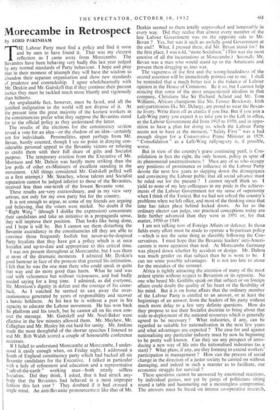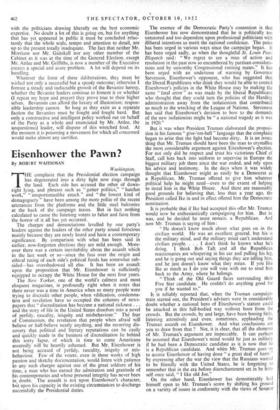Morecambe in Retrospect
By LORDPAKENHAM
THE Labour Party must find a policy and find it soon and be seen to have found it. That was my clearest reflection as I came away from Morecambe. The Bevanites have been behaving very badly this last year judged by any normal standards of Party behaviour. I hope and pray that in their moment of triumph they will have the wisdom to abandon their separate organisation and show new standards of prudence and comradeship. I agree wholeheartedly with Mr. Deakin and Mr. Gaitskell that if they continue their present tactics they must be tackled much more bluntly and vigorously than hitherto.
An unpalatable fact, however, must be faced, and all the justified indignation in the world will not dispose of it. At the present time the great majority of the keenest workers in the constituencies prefer what they suppose the Bevanites stand for to the official policy as they understand the latter.
The results of the elections for the constituency section reveal a vote for an idea—or the shadow of an idea—certainly not for individuals. Personalities, apart perhaps from Mr. Bevan, hardly counted, though I see no point in denying con- siderable personal appeal to the Bevanite victors or refusing to credit them with their full share of gifts and Socialist purpose. The temporary eviction from the Executive of Mr. Morrison and Mr. Dalton was hardly more striking than the low polls of other ex-Ministers of excellent standing in the movement. (All things considered Mr. Gaitskell polled well as a first attempt.) Mr. Strachey, whose talents and Socialist reputation cannot be judged inferior to those of the Bevanites, received less than one-tenth of the lowest Bevanite vote.
These results are 'very extraordinary, and in my view very serious, not only for my own party but for the country.
It is not enough to argue, as some of my friends are arguing and believing, that the voters were misled. No doubt if the " Right Wing " (though I dislike the expression) concentrate their candidates and take an initiative in a. propaganda sense, they will improve their position. That looks like being done, and I hope it will be. But I cannot see them disturbing the Bevanite ascendancy in the constituencies till they are able to convince those frequently foolish but never-to-be-despised Party loyalists that they have got a policy which is at once Socialist and up-to-date and appropriate to this critical time.
I was not present throughout at Morecambe, but I was there at most of the dramatic moments. I admired Mr. Deakin's good humour in face of the protests that greeted his intimation. I felt that he was the one man there who could speak in quite that way and do more good than harm. What he said was said with vehemence but without viciousness, and had badly needed saying for a long time I admired, as did everyone, Mr. Morrison's dignity in defeat and the courage of his come- back. As I watched he seemed to cast away the over- cautiousness generated by years of responsibility and recover a heroic boldness. At his best he is without a peer in his capacity to educate the Labour movement. He has won back his platform and his touch, but he cannot all on his own con- coct the message. Mr. Gaitskell and Mr. Noel-Baker were effective in the few minutes allowed them. Mr. Mayhew, Mr. Callaghan and Mr. Healey hit out hard for sanity. Mr. Jenkins made the most thoughtful of the shorter speeches I listened to and Mr. Bob Walsh scored a couple of honourable conference successes.
If I failed to understand Morecambe at Morecambe, I under- stood it easily enough when, on Friday night, I addressed a South of England constituency party which had backed all six Bevanite candidates for the Executive. I talked in particular with a lady of refinement and education and a representative " salt-of-the-earth " working man—both utterly selfless Socialists. Did they think, I asked, that it had struck any- body that the Bevanites had behaved in a most improper fashion this last year ? They doubted if it had crossed a single mind. An anti-Bevanite pronouncement like that of Mr. Deakin seemed to them totally unprovoked and lamentable in every way. Did they realise that almost every member of the late Labour Government was on the opposite side to Mr. Bevan ? Yes, but was it such an awfully good Government at the end? What, I pressed them, did Mr. Bevan stand for? In the first place, I was told, "more Socialism." (This was the most emotive of all the incantations at Morecambe.) Secondly Mr. Bevan was a man who would stand up to the Americans and prevent them dragging us into war.
The vagueness of the first and the wrong-headedness of the second assertion will be immediately pointed out to me. I shall be reminded that a much better test is the balance of Labour opinion in the House of Commons. Be it so, but I cannot help noticing that some of the most unquestioned idealists in that company, Christians like Sir Richard Acland and Mr. Tom Williams, African champions like Mr. Fenner Brockway. Irish anti-partitionists Iike Mr. Delargy, are proud to wear the Bevan- ite livery. Write them off as cranks if you like. But if you join a Left-Wing party you expect it to take you to the Left in office, as the Labour Government did from 1945 to 1950. and in oppo- sition to have a plan for doing so, which the Labour Party seems not to have at the moment, " Safety First " was a bad enough slogan for a Conservative Prime Minister in 1929. " Consolidation " as a Left-Wing rallying-cry is, if possible, worse.
But in view of the country's grave continuing peril, is Con- solidation in fact the right, the only honest, policy in spite of its phenomenal unattractiveness ? Must any of us who occupy any positions of prominence or influence in the Labour Party devote the next few years to slapping down the demagogues and convincing the Labour public that all social advance must be ruled out for the present ? I cannot myself think so. I yield to none of my late colleagues in my pride in the achieve- ments of the Labour Government (or my sense of superiority when I think of the Tories). But we had not solved the country's problems when we left office, and most of the thinking since that time has taken place behind locked doors. As far as the ordinary elector can judge, our practical conceptions today are little further advanced than they were in 1951 or, for that matter, 1950 or 1949.
I am not talking now of Foreign Affairs or defence. In those fields every effort must be made to operate a bi-partisan policy —which is not the same thing as slavishly following the Con- servatives. I must hope that the Bevanite leaders' anti-Ameri- canism is more apparent than real. At Morecambe Germany was played down whether by accident or design. Mr. Dalton was much gentler on that subject than he is wont to be. I can see some possible advantages. It is not too late to atone for the mistakes of the summer.
Africa is rightly attracting the attention of many of the most ardent spirits without respect to Bevanism or its opposite. No one who heard Mr. Griffiths speak on that subject or on foreign affairs could doubt the quality of his heart or the flexibility of his mind. But it is on home affairs that the ordinary member of the Labour Party is entitled to an answer, or at least the beginnings of an answer, from the leaders of his party without much more delay to a few very definite questions. How do they propose to use their Socialist doctrine to bring about that wide re-deployment of the national resources which is generally agreed to be necessary ? What industries, if any, can be regarded as suitable for nationalisation in the next few years and what advantages are expected ?' The case for and against nationalising any particular industry must by now be beginning to be pretty well known. Can they see any prospect of intro- ducing a new way of life into the nationalised industries (as a start) ? What plans, if any, are they forming to extend workers' participation in management ? How can the process of social change in the direction of a juster society be carried on without damaging, and indeed in such a manner as to facilitate, our economic struggle for survival ?
These questions cannot be answered by emotional reactions, by individual genius, nor yet by gangs of politicians sitting round a table and hammering out a meaningless compromise. The answers must be based on intense co-operative research, with the politicians drawing liberally on the best economic expertise. No doubt a lot of this is going on, but for anything that has yet appeared in public it must be concluded reluc- tantly that the whole scale, tempo and attention to detail, are up to the present totally inadequate. The fact that neither Mr. Morrison nor Mr. Gaitskell nor any other member of the Cabinet as it was at the time of the General Election, except Mr. Attlee and Mr. Griffiths, is now a member of the Executive creates a special and acute problem. A lot will depend on its handling.
Whatever the form of these deliberations, they must be wished not only a successful but a speedy outcome; otherwise I foresee a steady and ineluctable growth of the Bevanite heresy, whether the Bevanite leaders continue to foment it or whether (1 repeat my hope and prayer) they prove true to their higher selves. Bevanism can afford the luxury of illusionism; respon- sible leadership cannot. So long as they exist as a separate faction the Bevanites must be fought and fought hard. But only a constructive and intelligent policy worked out on behalf of the Party as a whole and enunciated by Mr. Attlee, the unquestioned leader, will dispose of this wretched feud. At the moment it is poisoning a movement for which all concerned would make almost any sacrifice.



































 Previous page
Previous page